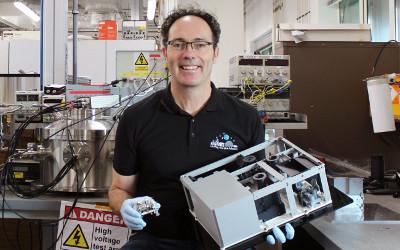Successful lift-off for historic mission to the Moon

Peregrine Mission One has successfully lifted off on its journey from Florida to the Moon on a historic mission that will pave the way for future exploration and long-term human presence in space.
Onboard is the Peregrine Ion Trap Mass Spectrometer (PITMS), which was developed in partnership between The Open University (OU), NASA Goddard Space Flight Center and Science Technology Facilities Council (STFC) RAL Space, the UK’s national space lab.
The PITMS instrument is based on a mass spectrometer (the EMS – exospheric mass spectrometer) developed by Dr Simeon Barber with support of £14 million through the UK Space Agency’s membership of the European Space Agency.
The spectrometer will analyse the incredibly thin atmosphere near the lunar surface, and study how water might be moving around the Moon today. The experiment is a pathfinder for future missions to the lunar poles where these molecules may become frozen in sufficient quantities to produce drinking water for astronauts.
Making good use of resources found locally on the Moon reduces our dependence on carrying all mission supplies from Earth and could be key to unlocking a more sustainable way of exploring space.
PITMS is a NASA-Provided Payload (Principal Investigator: Dr. Barbara Cohen, NASA Goddard Space Flight Center) being delivered to the Moon via NASA’s Commercial Lunar Payload Services initiative, with Peregrine being built and operated by Pittsburgh-based Astrobotic Technology.
Dr Simeon Barber said:
"PITMS will allow us to study the lunar water cycle and understand how a spacecraft interacts with the lunar surface and atmosphere. NASA’s Commercial Lunar Payload Services initiative is hugely exciting for lunar scientists, as it offers lots of opportunities to put new instruments on the Moon and do great science."
The launch happened at 02.18 EST from Launch Complex 41 at Cape Canaveral Space Force Station in Florida. Peregrine has about a 46-day journey to reach the lunar surface.
This is adapted from a story by Laura Bandell which originally appeared on OU News. Read the full story.
You may also be interested in:
Contact our news team
For all out of hours enquiries, please telephone +44 (0)7901 515891
Contact detailsNews & articles

OU research model drives literacy transformation across São Paulo
A major state-wide literacy programme in Brazil is demonstrating how Open University research is informing public policy at scale, following its high profile presentation at BETT London 2026 by São Paulo’s Secretary of Education, Renato Feder.